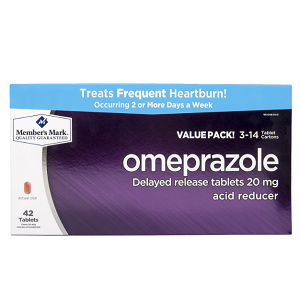Share
Omeprazole Acid Reducer (42 ct.)
Omeprazole Acid Reducer (42 ct.)
Couldn't load pickup availability
About this item
- Value pack
- 3-14 tablet cartons
- Delayed release tablets
Description
Omeprazole Acid Reducer treats frequent heartburn (occurs 2 or more days a week). It is not intended for immediate relief of heartburn and may take 1 to 4 days for full effect.
Assembled Country
USA
Component Country
USA And Imported
From the Manufacturer
Product Overview
-

ABOUT OMEPRAZOLE DELAYED RELEASE TABLETS 20 MG
Treats the same symptoms as Prilosec OTC®
Omeprazole Delayed Release Tablets 20 mg is a Proton Pump Inhibitor (PPI), the newest class of heartburn medications. PPIs actually deactivate the pumps in the stomach lining from producing acid, significantly inhibiting acid production (and its overproduction) at the source. PPIs are available over-the-counter or as a prescription to treat ulcers, gastroesophageal reflux disease (GERD) and erosive esophagitis.
PPIs include store-brand Omeprazole Delayed Release Tablets 20 mg (treats the same symptoms as Prilosec OTC®) and Lansoprazole Delayed-Release Capsules, 15 mg (treats the same symptoms as Prevacid® 24HR), to treat frequent heartburn that occurs two or more days per week. These products may take 1 to 4 days to work initially and are not indicated for immediate relief of frequent heartburn. Over-the-counter PPIs such as Omeprazole Delayed Release Tablets 20 mg and Lansoprazole Delayed-Release Capsules, 15 mg should be used as a 14-day course of treatment every four months. You should not take PPIs for more than 14 days unless directed by your doctor.Indications: Treats frequent heartburn occurring two or more days a week.
Features
-

UNDERSTANDING HEARTBURN
Heartburn is a painful, burning sensation in the lower chest or throat that occurs when stomach acid backs up (or 'refluxes') and irritates the sensitive lining of the esophagus. The esophagus is the tube that carries food from the throat to the stomach. Normally, the lower esophageal sphincter acts like a trapdoor, letting food down into the stomach, while preventing stomach acids from coming back up into the esophagus. When it becomes too relaxed, it can allow stomach acid to flow backward into the esophagus, resulting in heartburn.
Who Gets Heartburn?
60 million American adults are affected by heartburn,1 with an estimated 30 million adults suffering from frequent heartburn2 (defined as heartburn that occurs two or more days per week).TIPS FOR PREVENTING HEARTBURN
• Do not lie flat or bend over after eating
• Do not wear tight-fitting clothing around the stomach
• Do not eat before bedtime
• Raise the head of your bed
• Avoid heartburn-causing foods such as rich, spicy, fatty or fried foods, chocolate, caffeine, alcohol and certain fruits and vegetables
• Eat slowly and avoid big meals
• If overweight, lose weight
• If you smoke, quit smoking -

FREQUENT HEARTBURN FACTS
To better understand and treat frequent heartburn, it is important to first identify common risk factors and facts:
Fact: Eating before bed triggers heartburn. You may experience worsening or more frequent heartburn if you routinely eat late at night. Try to eat at least 2-3 hours before bedtime so your body has time to digest before you lie down. Also, elevating the head of your bed may provide additional relief. According to a new heartburn incidence survey, 42% of frequent heartburn sufferers report trouble sleeping because of this condition.
Fact: Holiday heartburn is real. When Americans see a holiday dinner spread, they find that their eyes are bigger than their stomachs. In fact, when asked to name their worst "heartburn days of the year," those with frequent heartburn most often cited Thanksgiving (43%), followed by Christmas/Hanukkah (35%), and July 4th and New Year's Eve (both tied at 14%).
Fact: Smoking can worsen heartburn. When individuals smoke, it can cause the muscle between the stomach and esophagus to relax, which can contribute to stomach acid refluxing back into the esophagus.
Fact: Certain foods can provoke heartburn. People with frequent heartburn (74% of frequent heartburn sufferers overall) report that certain foods and beverages can trigger their heartburn. According to the survey, acidic foods (41%), spicy foods (32%), rich or fatty foods (24%), caffeinated beverage (16%), alcohol (7%) and dairy products (7%) trigger frequent heartburn episodes. Eating too quickly, overeating / eating large meals and being overweight are related heartburn triggers.
Fact: Heartburn poses real risks. Frequent heartburn that goes untreated can increase the risk of developing more serious conditions, such as esophageal damage and throat cancer.
HEARTBURN NUMBERS
-

DOSING INFORMATION
Directions
• for adults 18 years of age and older
• this product is to be used once a day (every 24 hours), every day for 14 days
• it may take 1 to 4 days for full effect; some people get complete relief of symptoms within 24 hours
14-day Course of Treatment
• swallow 1 tablet with a glass of water before eating in the morning
• take every day for 14 days
• do not take more than 1 tablet a day
• do not use for more than 14 days unless directed by your doctor
• swallow whole. Do not chew or crush tablets
Repeated 14-Day Courses (if needed)
• you may repeat a 14-day course every 4 months
• do not take for more than 14 days or more often than every 4 months unless directed by a doctor
• children under 18 years of age: ask a doctor. Heartburn in children may sometimes be caused by a serious condition.
Drug Facts
-

Made in Israel

Subscribe to our emails
Be the first to know about new collections and exclusive offers.

